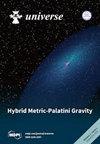X17:现状与展望
IF 2.5
4区 物理与天体物理
Q2 ASTRONOMY & ASTROPHYSICS
引用次数: 0
摘要
最近,由 A. J. Krasznahorkay 指导的一个研究小组在三种不同的核反应(即 3H(p,e-e+)4He、7Li(p,e-e+)8Be 和 11B(p,e-e+)12C)过程中观察到了电子-正电子对发射的异常现象。运动学表明,这种异常可能是由于 4He、8Be 和 12C 核的去唤起,发射出质量约为 17 MeV 的玻色子,迅速衰变为 e-e+ 对。本文回顾了利用 ATOMKI 单子加速器进行的实验结果,并讨论了所谓的 X17 玻色子在粒子物理学和宇宙学中的影响。还报告了即将进行的旨在揭示 X17 玻色子可能存在的实验。本文章由计算机程序翻译,如有差异,请以英文原文为准。
X17: Status and Perspectives
Recently, a group directed by A. J. Krasznahorkay observed an anomaly in the emission of electron–positron pairs in three different nuclear reactions, namely, the 3H(p,e−e+)4He, 7Li(p,e−e+)8Be, and 11B(p,e−e+)12C processes. Kinematics indicate that this anomaly might be due to the de-excitation of 4He, 8Be, and 12C nuclei with the emission of a boson with a mass of about 17 MeV, rapidly decaying into e−e+ pairs. The result of the experiments performed with the singletron accelerator of ATOMKI is reviewed, and the consequences of the so-called X17 boson in particle physics and in cosmology are discussed. Forthcoming experiments designed to shed light on the possible existence of the X17 boson are also reported.
求助全文
通过发布文献求助,成功后即可免费获取论文全文。
去求助
来源期刊

Universe
Physics and Astronomy-General Physics and Astronomy
CiteScore
4.30
自引率
17.20%
发文量
562
审稿时长
24.38 days
期刊介绍:
Universe (ISSN 2218-1997) is an international peer-reviewed open access journal focused on fundamental principles in physics. It publishes reviews, research papers, communications, conference reports and short notes. Our aim is to encourage scientists to publish their research results in as much detail as possible. There is no restriction on the length of the papers.
 求助内容:
求助内容: 应助结果提醒方式:
应助结果提醒方式:


